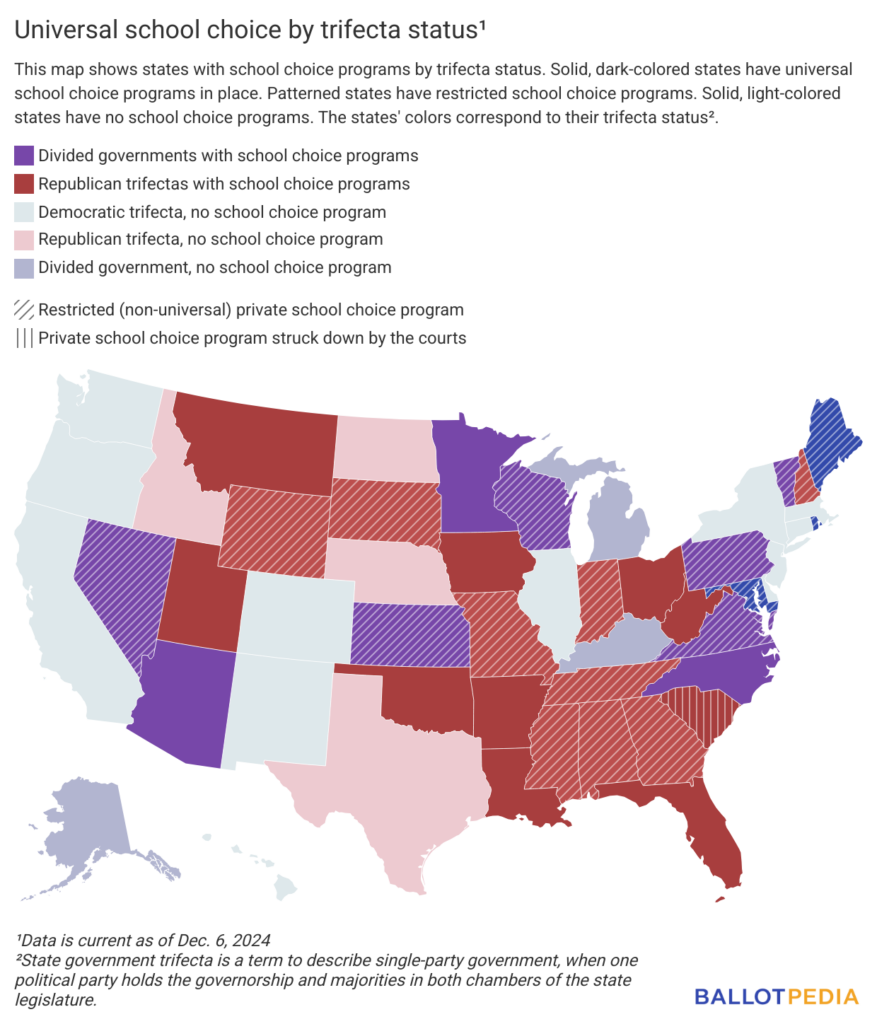Texas State Senate Republicans introduced a universal school choice bill (Senate Bill 2) on Jan. 24, and the Senate Education Committee approved it 9-2 on Jan. 29. SB 2 was placed on the Senate's intent calendar for a floor vote on February 4.
SB 2 would create an education savings account (ESA) program that, subject to funding, would provide an account for any student eligible for public school but not enrolled in public school. SB 2 would provide $10,000 per year for any student enrolled in an accredited private school and $11,500 per year for private school students with disabilities. Students participating in the program but not enrolled in an accredited private school would receive $2,000. The accounts could be used by students' parents or guardians for education-related expenses from pre-approved schools or providers. ESA programs are a type of private school choice program.
Texas Governor Greg Abbott (R) has prioritized expanding access to private school choice. During the 2024 Texas Republican primary Gov. Abbott campaigned against Republicans who had voted against ESAs in 2023. In 2024, 14 legislators supportive of private school choice were elected to the Texas State House of Representatives replacing Republicans who had voted against ESAs in 2023.
Abbott said the Texas House now has 79 proponents of private school choice, which is slightly more than the simple majority needed to pass school choice legislation. The Texas Senate has historically supported private school choice.
Texas Republicans have controlled the governor's office and both chambers of the state legislature since 2003. Texas is one of four Republican Trifectas without any private school choice program. Six Republican trifecta states have passed universal ESAs since 2021. Twelve (12) states—nine Republican trifectas and three states with divided governments—have universal private school choice programs, meaning that any student is eligible for the program and it is not limited to students with disabilities, families under certain income thresholds, or students living in certain areas or zoned to certain schools.
Background:
During the 2023 Texas legislative session, 21 Texas House Republicans joined 63 House Democrats and voted to remove education savings account (ESA) provisions from an education bill 84-63. A simple majority in the Texas House of Representatives is 76 votes.
Gov. Abbott campaigned against Republicans who did not support school choice in the 2024 Republican primary election. Abbott endorsed 12 Republican candidates who supported school choice in the primary, seven of whom won the primary, while the other five advanced to the May 2024 run-off. Two additional candidates that supported school choice won the primary or went to the runoff.
Of the Republicans who opposed ESAs during the 2023 legislative session, nine lost in the 2024 primaries, five opted not to run again, and seven are returning to the Texas House for the 2025 legislative session.
One returning Republican representative, Jay Dean, did not support ESAs in the 2023 session but told school board members in his district that legislation was likely to pass. He, like other representatives from rural areas, has criticized universal school choice due to concerns about whether it would help families in rural areas and how it would impact rural school districts.
Every pro-school choice candidate Gov. Abbott supported was elected. The following 14 pro-school choice Republicans won their districts:
- Joanne Shofner (R) - House District 11
- Trey Wharton (R) - House District 12
- Paul Dyson (R) - House District 14
- Janis Holt (R) - House District 18
- Jeffrey Barry (R) - House District 29
- Katrina Pierson (R) - House District 33
- Alan Schoolcraft (R) - House District 44
- Wes Virdell (R) - House District 53
- Hillary Hickland (R) - House District 55
- Helen Kerwin (R) - House District 58
- Mike Olcott (R) - House District 60
- Shelley Luther (R) - House District 62
- Caroline Fairly (R) - House District 87
- Marc LaHood (R) - House District 121
Gov. Abbott said that after 2024 elections there was a 79-vote majority in the Texas House of Representatives that would support school choice legislation
To read more, visit Ballotpedia's project on the impact of school choice on rural districts, which includes case studies on legislative support for and opposition to universal school choice in Texas and North Carolina.

Additional Reading:



